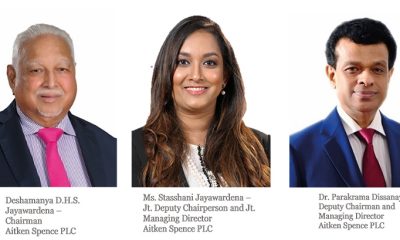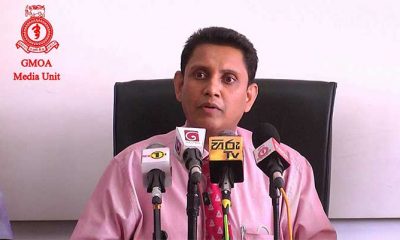Features
Taxing the taxed

By Dr Sirimewan Dharmaratne,
Senior Research Officer, HMRC, UK.
Years of laissez-faire attitude towards taxation has finally caught up. Withal lack of sensible fiscal policies, the political phobia of a sensible tax regime has left Sri Lanka facing the quandary of large tax increases, which the public must now acquiesce. Unbridled taxation however will leave deep economic and social scars. This is why it should be approached with caution to prevent a regressive effect on the economy. There are many ways the government could take intelligent, fair, and justified approach to taxation especially at a time of widespread privation. The focus should be on clamping down on tax avoidance and evasion, before considering tax increases.
While the government has taken some meaningful steps, it may have also left the door open for large scale tax avoidance. This is because capital gains from selling shares or dividends are apparently and inexplicably exempt from income tax. High income individuals could be paid in shares, which they could immediately sell and avoid paying income tax. The government cannot allow such avoidance schemes without compunction at a time of a national crisis.
Reducing Tax Evasion – Ghosts and Moonlighters
In tax jargon moonlighters are those who work in second jobs but report income from only one source. Those who just hide in plain sight are tax ‘Ghosts’. Moonlighters pay tax, but their day job, but moonlighting income is likely to be off the books. Those who work primarily on cash basis, operating completely under the tax radar are tax ghosts. These individuals generate a vast amount income that could go completely untaxed. There are a few initiatives that the government could take to capture these individuals in the tax net.
Having a tax record for all those over 18 appears to be step in the right direction. However, this will create unnecessary records without clear benefits. The objective should be to create a record that will yield some tax. These are a few measures that are taken by the UK tax authorities that could be useful for the Sri Lankan Revenue as well.
Employer Database
Require all employers to register with the Revenue. Each employer is given a unique employer reference number and all employees will have their unique TIN. If an employer has 10 employees, there will be 10 records for this employer under the same employer reference, showing the payments paid to each of the ten employees. Every time an employee change employment or engage in more than one employment, each employer has the obligation to supply that information to the Revenue. Therefore, a record is created only when triggered by a potential tax liability. This database will capture all employments. By bring in all SMEs into this network of employers, the tax net could be stretched far and wider.
Finding Unearned Income
Large part of the rental income probably goes untax. Search for a holiday accommodation returns hundreds of properties available all over the country, often for eye-watering rates, especially in Colombo and its purlieu. Most of these properties are likely to be rented out through estate agents. The Revenue should have the authority to contact the agents and require them to submit lists of their clients along with rental incomes. This is much more efficient than approaching each property through the mailbox. Holiday rentals are more than likely to be not occupied throughout the year, but the estate agent would be able to provide accurate assessment of occupation rates and income.
Accredit trades and Services
Requiring that traders belong it an accredited professional body is one way of formalising various trades. Plumbers, electricians, builders, those in health and beauty industry, should all be required to register with a professional body. This body should make sure that members have required qualifications to practice the trade. Although, they will be self-employed sole traders, they will no longer be ghosts as the government will have access to their membership information. Customers should be encouraged to hire only those who are able to show their trade credentials. Traders could be made to accredit by making it illegal to practice a trade without a proper license. More positive incentives can be given through access various government incentive such as training subsidies, favourable credit, import tax concessions, etc.
Contractors
For those individuals who work on contract basis, on demand or on call basis, similar information is obtained through the hiring companies. If a builder or a plumber is hired on a contract basis, then company should be required to provide that information to the Revenue. Especially, for labour providers, which has become commonplace in Sri Lanka, this is a must.
Since they are not regular employers, they should be considered as a different category, but record keeping as far as Revenue is concerned would be similar. An employee in one company may work as a contractor for another. Therefore, different types of income records for the same individual (same TIN) could be compiled in an efficient manner to calculate the total tax liability.
Slipping through the net
Despite all these there will be a large group who will still fall through the tax net. This is a seminal feature in mostly cash-based economies, where even major transactions, like house purchases occur through cash payments. Although income maybe hidden or transactions unrecorded, it is difficult to hide consumption. It is a known economic theory that propensity to consume is similar across similar income groups. Such theories are used by UK tax authorities to determine unreported income. Using various methods and data to match income and consumption, millions of taxpayers have been asked to justify their spending.
Spending Event Triggers
Large spending events or incidences should trigger investigations. In Sri Lanka there is ample opportunity for this. Extravagant functions such as weddings, religious ceremonies, birthday parties are prevalent without any visible income. Then there are all other events where people seem to conjure up money out of thin air. In settling fines, paying bills, making contributions, reporting losses due shady investments or simply reporting burglaries and thefts, very nondescript individuals seem to have fantastic amounts of cash just laying around.
These events should immediately trigger investigations. When unaccounted money is discovered, the Revenue has the first shot at getting the right amount of tax. The question of legality is a matter of indifference to the Revenue. Once that is recovered, all the others, such as banks, creditors and the judiciary could do as they please.
Establish a High-Net-Worth Individual Unit (HNWIU)
Most Sri Lankans have the opinion, probably justified, that very wealthy individuals hardly pay any tax. This has led to widespread discontent and recrimination of government’s tax policies. Therefore, it is important that the public see those who are well-off paying their dues. Once of the initiatives that the UK government has taking is to establish a High-Net-Worth Individual Unit (HNWIU).
This unit exclusively deals with those who apparently have considerable income based on their consumption patterns but not paying tax to commensurate with the lifestyle. This unit should have highly trained professional who are sworn to carry out their duties. The identity of this unit should be available only to the senior managers in the Revenue to protect and maintain their integrity.
Tax Gap – Measure of Evasion
Widespread evasion, sanctioned by politicians and others will only make honest people rogues. Therefore, it is necessary that the public see objective evidence of reduction in tax evasion and not just anecdotes. This is done by measuring the tax gap. Tax gap is the difference between theoretical or the actual amount of tax that should have been collected and the amount that was collected. This can be done by different taxes such as income tax, corporation tax, VAT, etc to see where the gaps are larger and hance more evasion. UK tax authorities calculate the tax gap every year to measure the efficacy of their evasion tackling measures. Tax gap has been brought down from 20% over a few years ago to the current 5%. Calculating the tax gap should be part of plan by the Revenue for modernising taxation in Sri Lanka.
Future of Taxation on Sri Lanka
A strong tax base is a quintessential feature of a vibrant economy. Without it, essential public services and public good cannot be provided. However, taxes should be fair and just. Tax burden should be proportionally distributed based on income. Those who can be easily targeted tax should not get the brunt of the tax burden. Indirect taxes, other than ‘sin taxes’ affect less well-off disproportionally. Feature of a good tax system is to reduce indirect taxes and increase direct taxes.
This can only be achieved by de-coupling the taxation process from politics. An independent tax authority should be established giving vast powers to go after anyone as they deem necessary. Strong tax laws will enable to drastically reduce crime as well. Many famous or infamous people have been indited or jail for tax evasion rather than crimes committed, the latest causality being the US President’s son. While the burden of proof of a crime maybe harder to gather tax evasion is much more straightforward.
Objective evasion measures should be calculated to give more credibility to the tax collection process. Honest tax paying public should be content that it is working fairly for everyone. Focus should be more on direct taxes and not on consumption taxes. Convoluted indirect taxes almost never yield the expected revenue because of simple demand and supply forces. Further, most consumption taxes unfairly affect the poor. If they are implemented, at the least, all basic goods and services should be exempted, and higher rates imposed on luxury goods and services.
A proud nation should be supporting itself and not begging for other people’s tax money while living extravagant and pretentious lifestyles. At the end of the day, one is identified by the country and not by their domestic lifestyle. To outsides all are Sri Lankans and carry that identity everywhere. Unless steps are taken to restore and protect this identity, it will remain confined to the dustbin of failed nations despite empty rhetoric of clueless leaders.
Features
The heart-friendly health minister

by Dr Gotabhya Ranasinghe
Senior Consultant Cardiologist
National Hospital Sri Lanka
When we sought a meeting with Hon Dr. Ramesh Pathirana, Minister of Health, he graciously cleared his busy schedule to accommodate us. Renowned for his attentive listening and deep understanding, Minister Pathirana is dedicated to advancing the health sector. His openness and transparency exemplify the qualities of an exemplary politician and minister.
Dr. Palitha Mahipala, the current Health Secretary, demonstrates both commendable enthusiasm and unwavering support. This combination of attributes makes him a highly compatible colleague for the esteemed Minister of Health.
Our discussion centered on a project that has been in the works for the past 30 years, one that no other minister had managed to advance.
Minister Pathirana, however, recognized the project’s significance and its potential to revolutionize care for heart patients.
The project involves the construction of a state-of-the-art facility at the premises of the National Hospital Colombo. The project’s location within the premises of the National Hospital underscores its importance and relevance to the healthcare infrastructure of the nation.
This facility will include a cardiology building and a tertiary care center, equipped with the latest technology to handle and treat all types of heart-related conditions and surgeries.
Securing funding was a major milestone for this initiative. Minister Pathirana successfully obtained approval for a $40 billion loan from the Asian Development Bank. With the funding in place, the foundation stone is scheduled to be laid in September this year, and construction will begin in January 2025.
This project guarantees a consistent and uninterrupted supply of stents and related medications for heart patients. As a result, patients will have timely access to essential medical supplies during their treatment and recovery. By securing these critical resources, the project aims to enhance patient outcomes, minimize treatment delays, and maintain the highest standards of cardiac care.
Upon its fruition, this monumental building will serve as a beacon of hope and healing, symbolizing the unwavering dedication to improving patient outcomes and fostering a healthier society.We anticipate a future marked by significant progress and positive outcomes in Sri Lanka’s cardiovascular treatment landscape within the foreseeable timeframe.
Features
A LOVING TRIBUTE TO JESUIT FR. ALOYSIUS PIERIS ON HIS 90th BIRTHDAY

by Fr. Emmanuel Fernando, OMI
Jesuit Fr. Aloysius Pieris (affectionately called Fr. Aloy) celebrated his 90th birthday on April 9, 2024 and I, as the editor of our Oblate Journal, THE MISSIONARY OBLATE had gone to press by that time. Immediately I decided to publish an article, appreciating the untiring selfless services he continues to offer for inter-Faith dialogue, the renewal of the Catholic Church, his concern for the poor and the suffering Sri Lankan masses and to me, the present writer.
It was in 1988, when I was appointed Director of the Oblate Scholastics at Ampitiya by the then Oblate Provincial Fr. Anselm Silva, that I came to know Fr. Aloy more closely. Knowing well his expertise in matters spiritual, theological, Indological and pastoral, and with the collaborative spirit of my companion-formators, our Oblate Scholastics were sent to Tulana, the Research and Encounter Centre, Kelaniya, of which he is the Founder-Director, for ‘exposure-programmes’ on matters spiritual, biblical, theological and pastoral. Some of these dimensions according to my view and that of my companion-formators, were not available at the National Seminary, Ampitiya.
Ever since that time, our Oblate formators/ accompaniers at the Oblate Scholasticate, Ampitiya , have continued to send our Oblate Scholastics to Tulana Centre for deepening their insights and convictions regarding matters needed to serve the people in today’s context. Fr. Aloy also had tried very enthusiastically with the Oblate team headed by Frs. Oswald Firth and Clement Waidyasekara to begin a Theologate, directed by the Religious Congregations in Sri Lanka, for the contextual formation/ accompaniment of their members. It should very well be a desired goal of the Leaders / Provincials of the Religious Congregations.
Besides being a formator/accompanier at the Oblate Scholasticate, I was entrusted also with the task of editing and publishing our Oblate journal, ‘The Missionary Oblate’. To maintain the quality of the journal I continue to depend on Fr. Aloy for his thought-provoking and stimulating articles on Biblical Spirituality, Biblical Theology and Ecclesiology. I am very grateful to him for his generous assistance. Of late, his writings on renewal of the Church, initiated by Pope St. John XX111 and continued by Pope Francis through the Synodal path, published in our Oblate journal, enable our readers to focus their attention also on the needed renewal in the Catholic Church in Sri Lanka. Fr. Aloy appreciated very much the Synodal path adopted by the Jesuit Pope Francis for the renewal of the Church, rooted very much on prayerful discernment. In my Religious and presbyteral life, Fr.Aloy continues to be my spiritual animator / guide and ongoing formator / acccompanier.
Fr. Aloysius Pieris, BA Hons (Lond), LPh (SHC, India), STL (PFT, Naples), PhD (SLU/VC), ThD (Tilburg), D.Ltt (KU), has been one of the eminent Asian theologians well recognized internationally and one who has lectured and held visiting chairs in many universities both in the West and in the East. Many members of Religious Congregations from Asian countries have benefited from his lectures and guidance in the East Asian Pastoral Institute (EAPI) in Manila, Philippines. He had been a Theologian consulted by the Federation of Asian Bishops’ Conferences for many years. During his professorship at the Gregorian University in Rome, he was called to be a member of a special group of advisers on other religions consulted by Pope Paul VI.
Fr. Aloy is the author of more than 30 books and well over 500 Research Papers. Some of his books and articles have been translated and published in several countries. Among those books, one can find the following: 1) The Genesis of an Asian Theology of Liberation (An Autobiographical Excursus on the Art of Theologising in Asia, 2) An Asian Theology of Liberation, 3) Providential Timeliness of Vatican 11 (a long-overdue halt to a scandalous millennium, 4) Give Vatican 11 a chance, 5) Leadership in the Church, 6) Relishing our faith in working for justice (Themes for study and discussion), 7) A Message meant mainly, not exclusively for Jesuits (Background information necessary for helping Francis renew the Church), 8) Lent in Lanka (Reflections and Resolutions, 9) Love meets wisdom (A Christian Experience of Buddhism, 10) Fire and Water 11) God’s Reign for God’s poor, 12) Our Unhiddden Agenda (How we Jesuits work, pray and form our men). He is also the Editor of two journals, Vagdevi, Journal of Religious Reflection and Dialogue, New Series.
Fr. Aloy has a BA in Pali and Sanskrit from the University of London and a Ph.D in Buddhist Philosophy from the University of Sri Lankan, Vidyodaya Campus. On Nov. 23, 2019, he was awarded the prestigious honorary Doctorate of Literature (D.Litt) by the Chancellor of the University of Kelaniya, the Most Venerable Welamitiyawe Dharmakirthi Sri Kusala Dhamma Thera.
Fr. Aloy continues to be a promoter of Gospel values and virtues. Justice as a constitutive dimension of love and social concern for the downtrodden masses are very much noted in his life and work. He had very much appreciated the commitment of the late Fr. Joseph (Joe) Fernando, the National Director of the Social and Economic Centre (SEDEC) for the poor.
In Sri Lanka, a few religious Congregations – the Good Shepherd Sisters, the Christian Brothers, the Marist Brothers and the Oblates – have invited him to animate their members especially during their Provincial Congresses, Chapters and International Conferences. The mainline Christian Churches also have sought his advice and followed his seminars. I, for one, regret very much, that the Sri Lankan authorities of the Catholic Church –today’s Hierarchy—- have not sought Fr.
Aloy’s expertise for the renewal of the Catholic Church in Sri Lanka and thus have not benefited from the immense store of wisdom and insight that he can offer to our local Church while the Sri Lankan bishops who governed the Catholic church in the immediate aftermath of the Second Vatican Council (Edmund Fernando OMI, Anthony de Saram, Leo Nanayakkara OSB, Frank Marcus Fernando, Paul Perera,) visited him and consulted him on many matters. Among the Tamil Bishops, Bishop Rayappu Joseph was keeping close contact with him and Bishop J. Deogupillai hosted him and his team visiting him after the horrible Black July massacre of Tamils.
Features
A fairy tale, success or debacle

Sri Lanka-Singapore Free Trade Agreement
By Gomi Senadhira
senadhiragomi@gmail.com
“You might tell fairy tales, but the progress of a country cannot be achieved through such narratives. A country cannot be developed by making false promises. The country moved backward because of the electoral promises made by political parties throughout time. We have witnessed that the ultimate result of this is the country becoming bankrupt. Unfortunately, many segments of the population have not come to realize this yet.” – President Ranil Wickremesinghe, 2024 Budget speech
Any Sri Lankan would agree with the above words of President Wickremesinghe on the false promises our politicians and officials make and the fairy tales they narrate which bankrupted this country. So, to understand this, let’s look at one such fairy tale with lots of false promises; Ranil Wickremesinghe’s greatest achievement in the area of international trade and investment promotion during the Yahapalana period, Sri Lanka-Singapore Free Trade Agreement (SLSFTA).
It is appropriate and timely to do it now as Finance Minister Wickremesinghe has just presented to parliament a bill on the National Policy on Economic Transformation which includes the establishment of an Office for International Trade and the Sri Lanka Institute of Economics and International Trade.
Was SLSFTA a “Cleverly negotiated Free Trade Agreement” as stated by the (former) Minister of Development Strategies and International Trade Malik Samarawickrama during the Parliamentary Debate on the SLSFTA in July 2018, or a colossal blunder covered up with lies, false promises, and fairy tales? After SLSFTA was signed there were a number of fairy tales published on this agreement by the Ministry of Development Strategies and International, Institute of Policy Studies, and others.
However, for this article, I would like to limit my comments to the speech by Minister Samarawickrama during the Parliamentary Debate, and the two most important areas in the agreement which were covered up with lies, fairy tales, and false promises, namely: revenue loss for Sri Lanka and Investment from Singapore. On the other important area, “Waste products dumping” I do not want to comment here as I have written extensively on the issue.
1. The revenue loss
During the Parliamentary Debate in July 2018, Minister Samarawickrama stated “…. let me reiterate that this FTA with Singapore has been very cleverly negotiated by us…. The liberalisation programme under this FTA has been carefully designed to have the least impact on domestic industry and revenue collection. We have included all revenue sensitive items in the negative list of items which will not be subject to removal of tariff. Therefore, 97.8% revenue from Customs duty is protected. Our tariff liberalisation will take place over a period of 12-15 years! In fact, the revenue earned through tariffs on goods imported from Singapore last year was Rs. 35 billion.
The revenue loss for over the next 15 years due to the FTA is only Rs. 733 million– which when annualised, on average, is just Rs. 51 million. That is just 0.14% per year! So anyone who claims the Singapore FTA causes revenue loss to the Government cannot do basic arithmetic! Mr. Speaker, in conclusion, I call on my fellow members of this House – don’t mislead the public with baseless criticism that is not grounded in facts. Don’t look at petty politics and use these issues for your own political survival.”
I was surprised to read the minister’s speech because an article published in January 2018 in “The Straits Times“, based on information released by the Singaporean Negotiators stated, “…. With the FTA, tariff savings for Singapore exports are estimated to hit $10 million annually“.
As the annual tariff savings (that is the revenue loss for Sri Lanka) calculated by the Singaporean Negotiators, Singaporean $ 10 million (Sri Lankan rupees 1,200 million in 2018) was way above the rupees’ 733 million revenue loss for 15 years estimated by the Sri Lankan negotiators, it was clear to any observer that one of the parties to the agreement had not done the basic arithmetic!
Six years later, according to a report published by “The Morning” newspaper, speaking at the Committee on Public Finance (COPF) on 7th May 2024, Mr Samarawickrama’s chief trade negotiator K.J. Weerasinghehad had admitted “…. that forecasted revenue loss for the Government of Sri Lanka through the Singapore FTA is Rs. 450 million in 2023 and Rs. 1.3 billion in 2024.”
If these numbers are correct, as tariff liberalisation under the SLSFTA has just started, we will pass Rs 2 billion very soon. Then, the question is how Sri Lanka’s trade negotiators made such a colossal blunder. Didn’t they do their basic arithmetic? If they didn’t know how to do basic arithmetic they should have at least done their basic readings. For example, the headline of the article published in The Straits Times in January 2018 was “Singapore, Sri Lanka sign FTA, annual savings of $10m expected”.
Anyway, as Sri Lanka’s chief negotiator reiterated at the COPF meeting that “…. since 99% of the tariffs in Singapore have zero rates of duty, Sri Lanka has agreed on 80% tariff liberalisation over a period of 15 years while expecting Singapore investments to address the imbalance in trade,” let’s turn towards investment.
Investment from Singapore
In July 2018, speaking during the Parliamentary Debate on the FTA this is what Minister Malik Samarawickrama stated on investment from Singapore, “Already, thanks to this FTA, in just the past two-and-a-half months since the agreement came into effect we have received a proposal from Singapore for investment amounting to $ 14.8 billion in an oil refinery for export of petroleum products. In addition, we have proposals for a steel manufacturing plant for exports ($ 1 billion investment), flour milling plant ($ 50 million), sugar refinery ($ 200 million). This adds up to more than $ 16.05 billion in the pipeline on these projects alone.
And all of these projects will create thousands of more jobs for our people. In principle approval has already been granted by the BOI and the investors are awaiting the release of land the environmental approvals to commence the project.
I request the Opposition and those with vested interests to change their narrow-minded thinking and join us to develop our country. We must always look at what is best for the whole community, not just the few who may oppose. We owe it to our people to courageously take decisions that will change their lives for the better.”
According to the media report I quoted earlier, speaking at the Committee on Public Finance (COPF) Chief Negotiator Weerasinghe has admitted that Sri Lanka was not happy with overall Singapore investments that have come in the past few years in return for the trade liberalisation under the Singapore-Sri Lanka Free Trade Agreement. He has added that between 2021 and 2023 the total investment from Singapore had been around $162 million!
What happened to those projects worth $16 billion negotiated, thanks to the SLSFTA, in just the two-and-a-half months after the agreement came into effect and approved by the BOI? I do not know about the steel manufacturing plant for exports ($ 1 billion investment), flour milling plant ($ 50 million) and sugar refinery ($ 200 million).
However, story of the multibillion-dollar investment in the Petroleum Refinery unfolded in a manner that would qualify it as the best fairy tale with false promises presented by our politicians and the officials, prior to 2019 elections.
Though many Sri Lankans got to know, through the media which repeatedly highlighted a plethora of issues surrounding the project and the questionable credentials of the Singaporean investor, the construction work on the Mirrijiwela Oil Refinery along with the cement factory began on the24th of March 2019 with a bang and Minister Ranil Wickremesinghe and his ministers along with the foreign and local dignitaries laid the foundation stones.
That was few months before the 2019 Presidential elections. Inaugurating the construction work Prime Minister Ranil Wickremesinghe said the projects will create thousands of job opportunities in the area and surrounding districts.
The oil refinery, which was to be built over 200 acres of land, with the capacity to refine 200,000 barrels of crude oil per day, was to generate US$7 billion of exports and create 1,500 direct and 3,000 indirect jobs. The construction of the refinery was to be completed in 44 months. Four years later, in August 2023 the Cabinet of Ministers approved the proposal presented by President Ranil Wickremesinghe to cancel the agreement with the investors of the refinery as the project has not been implemented! Can they explain to the country how much money was wasted to produce that fairy tale?
It is obvious that the President, ministers, and officials had made huge blunders and had deliberately misled the public and the parliament on the revenue loss and potential investment from SLSFTA with fairy tales and false promises.
As the president himself said, a country cannot be developed by making false promises or with fairy tales and these false promises and fairy tales had bankrupted the country. “Unfortunately, many segments of the population have not come to realize this yet”.
(The writer, a specialist and an activist on trade and development issues . )
























